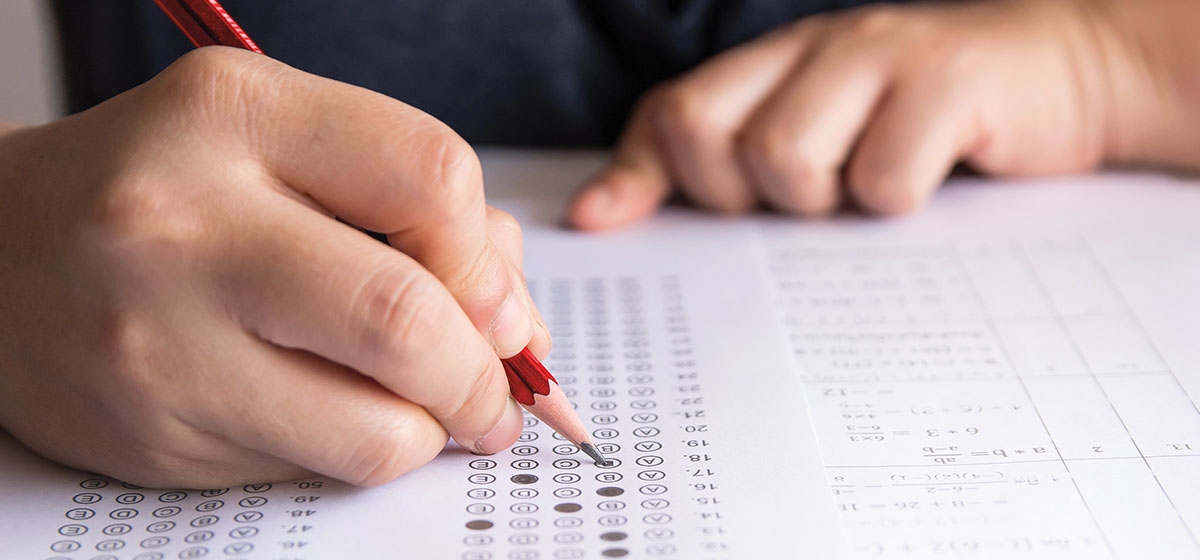Testing the Test

We’ve asked the leaders of a group of the region’s top independent schools to answer, in 200 words or fewer, the following question: “Whether it’s the PSSA tests that public schools are required to give or the latest changes in the SAT, there is often disagreement and sometimes controversy about the concept and emphasis on testing in schools. What is your school’s concept and strategy regarding the importance of testing and how tests should be administered in order to best prepare your students?”
Macon Finley, The Ellis School
We don’t believe in “teaching to the test” at The Ellis School, but rather focus on developing all the capabilities and strengths our girls will need to soar in life. We know our students will be expected to tussle with all sorts of interesting, challenging opportunities and problems once they leave us. Our goal is to give them as many experiences as possible that build the intellectual and social-emotional muscles they will need to be creative thinkers and flexible collaborators. Ellis teachers design those experiences using their masterful expertise in their subject matter and research-based understanding of approaches to teaching and learning.
Standardized tests are typically not particularly indicative of student strengths in the higher order thinking we believe is most essential. However, they can be helpful as one vehicle for assessing student growth around particular skills, and are used in certain grade levels at Ellis for that limited purpose. We also acknowledge that our students live in a world in which their proficiency on standardized tests will be one component of their evaluation by colleges. Toward that end, we make sure all our students are well prepared for college entrance testing when they reach that stage of their educational journeys.
Jeff Suzik, Falk Laboratory School
Standardized testing is one of thorniest issues affecting American schools today. It is inarguable that testing can, when used judiciously, help teachers serve students by providing benchmarks to identify strengths and diagnose challenges.
Unfortunately, schools far too frequently over-depend on data collected from such tests to drive curricular development and/or steer instruction in ways that do not serve children especially well. Significant portions of the school year end up being set aside either for students to sit for tests or, worse yet, to prepare for them in ways that are repetitive, monotonous, and, well, soul-sucking—for students and teachers alike. All of this occurs in spite of countless studies that have shown that such assessments are neither good predictors of teacher effectiveness nor of many students’ ultimate potential. Falk School has long-endorsed a core educational philosophy centered on hands-on, project-based learning, inquiry, free play and independent exploration of ideas; as such, we subject our students to almost no standardized testing of any kind in their nine years with us. But, because they learn how to be exceptional problem-solvers and critical thinkers, children emerge with the competencies and skills they need to thrive in later educational environments—and then some.
Bart Griffith, President, Shady Side Academy
At Shady Side Academy, we do not “teach to the test” or allow standardized assessments to drive our curriculum.
Unlike many schools, our curriculum is not built around Advanced Placement courses, due to their emphasis on speed and rote memorization. Instead we offer advanced courses that allow faculty to teach the content in a more engaging way, with a focus on collaborative and experiential learning. Recently, seven prominent independent schools in Washington D.C., announced they would abandon the AP courses that had been central to their curricula for years, citing the “diminished utility” of the program for these very reasons.
Most colleges still require the SAT or ACT, and our college counseling office offers students and families resources to help them practice and prepare for these exams. That said, many highly selective colleges have adopted a test-optional admissions process, motivated in part by the notion that standardized assessments do little to demonstrate mastery of the innovation and collaboration skills demanded by our creative economy.
So we are perhaps at an inflection point on standardized exams, and it is leading to rich discussion at schools everywhere. What do we want students to learn for the future? And how will we know they have learned it?
Justin Zimmerman, The Linsly School
As a college-preparatory independent day and boarding school, The Linsly School has much autonomy regarding standardized testing. Linsly is required to conduct one standardized test per year for students in grades 5–8 and grade 11. We are thankful that these are the only mandated testing requirements.
Because teachers don’t have to teach to a test, it allows them to focus on classroom instruction and provide meaningful feedback. It also gives our highly skilled teachers latitude to create effective assessments of learning. While we familiarize our students with standardized testing within our regular and AP courses, we want to make sure it does not interfere with better learning and assessment methods. Students need a variety of assessment tools and must be engaged in the learning and evaluation process.
At Linsly, teachers create midterm and year-end assessments that simulate what students will experience in college. Sometimes these midterm and year-end assessments are traditional; at other times, students are asked to complete projects, present portfolios, or demonstrate subject mastery in other ways. We believe this balanced approach helps provide important feedback for teachers and students, and it better prepares students to be successful in college and beyond.
Chad Barnett, St. Edmund’s Academy
Students benefit from demonstrating what they know and feeling accountable for their learning. At St. Edmund’s Academy, we do not reject testing. We reject standardization. The assembly-line row of classrooms emphasizing routine memorization led harmoniously to standardized tests. In today’s interconnected world those blunt instruments cannot measure the critical thinking, collaboration, and communication skills vital for success. They cannot measure a person’s adaptability, cultural competence, or character. Standardization perpetuates a narrow definition of intelligence, an approach that may diminish the worth of brilliant children and separate learning from meaningful contexts.
That’s why at St. Edmund’s Academy we administer minimal standardized tests to crosscheck our perception of outliers in our program. Those results sharpen our approach to fully support children’s learning needs. Students bring their fundamental skills honed through our core curriculum to relevant learning experiences immersing them in our interconnected world. To that end, St. Edmund’s Academy is a member of the Global Schools Program. Through the United Nation’s Sustainable Development Goals (SDGs) framework, our Signature Experiences for Global Goals transform learning environments globally with our school as a hub of education and leadership on SDGs, providing children with a robust foundation to thrive in our world.
This cannot be standardized.
Avi Baran Munro, Community Day School
Emotional intelligence. Athletic ability. Artistic talent. Work ethic. A compassionate heart. A sense of humor. A spiritual soul. These strengths don’t show up in any test score, but matter tremendously.
At Community Day School, we don’t teach to tests and we don’t use test scores as a value judgment of our students or curriculum. We are foremost guided by our mission, Jewish values, and input from our expert faculty, accreditors, and community.
While we assess student progress in multiple authentic ways all year, standardized testing has its place. Grades 2–8 take the ERB tests (considered the gold standard among private schools) during three half-days of school. These data help us track academic growth, meet individual learning needs, and benchmark school-wide progress by providing a rigorous comparison to students nationwide. They also give children test-taking practice—an important skill for high school and beyond.
Since testing can increase anxiety, ERBs are administered in a low-pressure atmosphere with time for mindfulness practice and recess. To prepare, we simply encourage a good night’s sleep and a good breakfast.
At CDS, we view assessment as an ongoing teaching art, with standardized tests an additional data point in the constellation of knowing the whole child. Mainly, we focus on providing deep learning experiences that prepare our students for the test that matters most—life.
Leslie Mitros, Aquinas Academy
Testing is an expectation in the life of a student. Whether these are classroom tests, or standardized tests, they provide one piece of information among many that give a snapshot of a student’s acquisition of knowledge and understanding of concepts. Directing my response more toward standardized testing, it certainly has its place in the school setting. In the lower school, standardized testing provides a normative measure of student achievement. It also provides feedback to the teachers on relative weaknesses and provides the opportunity to guide instruction. Also at the lower levels, standardized testing along with tests of cognitive ability at key grade levels provides the first clue in diagnosing learning disabilities for which intervention can positively change the course of a child’s learning.
With regard to “high-stakes” testing for college entrance, Aquinas Academy provides opportunities for students as early as 9th grade to become familiar with the format. Freshmen take the PSAT 8/9. Sophomores take the PSAT as well as the Pre-ACT. These experiences allow them to discern which of the two major college entrance exams is the better format for their own success in the junior and senior year. Aquinas Academy also provides optional test-preparation courses, which many of our students take prior to their junior year testing. However, the real preparation is simply done in the day-to-day learning that happens in the classroom. When teachers provide instruction that challenges students to develop critical skills appropriate to each grade level, students perform to the best of their ability on standardized tests.
Scott D. Fech, Winchester Thurston School
At Winchester Thurston School, we define success not only by academic standards, but also by our commitment to develop individuals of strong character who embrace our credo to “Think Also of the Comfort and the Rights of Others.”
With this as our measure, standardized tests (and testing in general), are used as but one data point among many. In fact, we insist that our students demonstrate their learning in authentic ways that align with real-world demands. This is the foundation of City as Our Campus, where teachers craft learning experiences which engage students with community partners.
Curricula are not aligned to a particular test, but rather towards what our faculty believe is important for our students to know. Then, working towards culminating events in all divisions, students develop projects, take risks, make mistakes, iterate, and make improvements—during and after which they are assessed by the very real-world process of presenting their thinking, processes, and findings to one another, to their parents, to impacted community members, and, of course, to their teachers. With these experiences and their gained knowledge, students are well-prepared for both typical assessments and more authentic engagement—throughout the course of their lives.
Jessica Webster, The Campus Laboratory School of Carlow University
At the Campus Laboratory School of Carlow University, we are fortunate to be free from the burden of high-stakes state testing, but we still prepare students to take the SAT, ACT or other tests throughout their education and careers. Therefore, it is important to ensure we prepare our students to think critically and grow into confident learners.
We strive to balance the attainment of discrete skills with opportunities for exploration, discovery and critical thinking. Assessments are one way to gather information on what students know and are able to do, but we must be careful that standardized assessments are seen for what they are: one snapshot. They provide us with information on curriculum alignment and programming needs. Standardized assessments do not capture the work we do to foster creativity, deep inquiry or problem solving and they certainly do not measure empathy or the social emotional skills we are building in an effort to build our future citizens and community leaders.
Part of our job, as educators, is to make sure we are collecting assessment information in a variety of ways and using that knowledge to ensure our programs are places where students thrive. We must be well versed in understanding our children’s strengths and needs, and sharing that information with our parents so we all can support the development of our students as lifelong learners and leaders.




